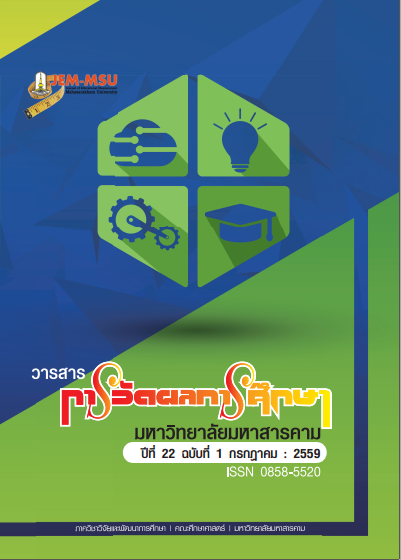Development of Internal Quality Assurance Practice Model for Small Sized Schools Using Research-Based Approach.
Main Article Content
Abstract
This research aimed to create a practice model for internal quality assurance in small
sized schools using research – based approach. This research was conducted in 4 phases.
Phase 1 focussed on the strengths and weaknesses of the small sized schools. The data were
collected from 1) the results of the 2nd round of external quality Assessment executive summary
from 183 small sized schools in the north-eastern region. 2) the interview with school
administrators, teachers who are responsible for the educational quality assurance, and the
small sized schools’ committees and 3) the survey in 720 school administrators and teachers
who responsible for educational quality assurance in the northeastern region, as well as a
focus group in 10 school administrators, 10 teachers and 10 external evaluators. Phase 2
creating the preliminary practice model and evaluation. The phase was conducted with the
school administrators, external evaluators and educators. Phase 3 Implementing and model
assessment in two small schools providing 2-3 educational levels. Phase 4 the study of
participants’ opinions. The data were collected from teachers, school communities and
students, Research instruments were the report of external evaluation, questionnaires and
interviews, standard assessment for internal quality assurance. Basic statistics, mean,
standard deviation and index & statistical analysis of PNImodified were used to analyze the
quantitative data. Content analysis was used to analyzed qualitative data.
The results of a development of internal quality assurance in small sized schools
using research – based approach showed that
1. the strengths of small school were the high levels of physical and mental
well-being of the students as well as aesthetics, ethics and moral, while the lack of skills for
and characteristics facilitating self-learning, lack of critical thinking skills, knowledge and
systematic thinking were the weaknesses of these small schools students . In regards to the
management process, the executive directors were competent and had high leadership skills
as well as receiving the support from the local community. However, the weakness of the
management process were the lack of student-focused teaching procedure and studentsfocused or local-focused curriculums 2) Research-based internal quality assurance practice
in the whole were needed to develop in small sized schools, especially in teaching
procedure and whole school development action research, the quality assessment process,
as well as the continuous quality improvement practice.
2. there were 5 steps for the research - based internal quality assurance in the
small sized schools. 1) Preparing the essential knowledge and concepts for quality assurance
using research–based approach, and forming quality assurance committee focussed on
community participation. 2) Developing the quality assurance standards within school. 3)
Developing the information system for the quality assurance system. 4) Providing the action
research to enhance learning and educational quality. 5) Implementing evaluation and using
its results in educational development continuously resulted the most effective
performance and the performer’s satisfactions were at high level.
3. There were some improvements from the sample schools after the
implementation of the practice model. The scores were increase at 83.69% and 83.34%
4. Participants were satisfied with the practice model at high level.
Article Details
The content and information contained in the published article in the Journal of Educational Measurement Mahasarakham University represent the opinions and responsibilities of the authors directly. The editorial board of the journal is not necessarily in agreement with or responsible for any of the content.
The articles, data, content, images, etc. that have been published in the Journal of Educational Measurement Mahasarakham University are copyrighted by the journal. If any individual or organization wishes to reproduce or perform any actions involving the entirety or any part of the content, they must obtain written permission from the Journal of Educational Measurement Mahasarakham University.


